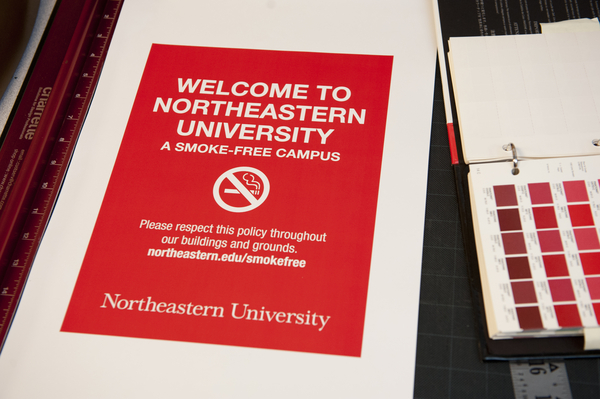3Qs: What to know about Northeastern’s smoke-free policy

 Northeastern announced plans in May to adopt a campuswide smoke-free policy, which will go into effect on Aug. 12. As the university prepares to go smoke-free, we asked Terry Fulmer, dean of the Bouvé College of Health Sciences and chair of the committee charged last year with exploring this issue, to discuss the policy and what changes will take place leading up to the fall semester. Fulmer chaired the committee along with co-chair John Auerbach, director of the Institute on Urban Health Research and a Distinguished Professor of Practice in the Department of Health Sciences.
Northeastern announced plans in May to adopt a campuswide smoke-free policy, which will go into effect on Aug. 12. As the university prepares to go smoke-free, we asked Terry Fulmer, dean of the Bouvé College of Health Sciences and chair of the committee charged last year with exploring this issue, to discuss the policy and what changes will take place leading up to the fall semester. Fulmer chaired the committee along with co-chair John Auerbach, director of the Institute on Urban Health Research and a Distinguished Professor of Practice in the Department of Health Sciences.
What changes will the Northeastern community see when the campus becomes smoke-free later this summer, and how will the university ensure adherence to this policy?
The Northeastern community will start to see new signage about the policy in the next couple of weeks. That goes for all our campuses, including Seattle and Charlotte, N.C. Ashtrays will also be removed. In addition, we’re educating our incoming students during their summer orientation and holding a series of trainings for faculty and staff. We look forward to helping people understand the parameters of the policy, which we know may take a little time.
In terms of adherence, it’s important to say first that this policy reflects our public health approach to smoking. There are already more than 1,100 campuses in the United States that are smoke-free. We think that, much like when smoking was discontinued in restaurants and bars, people will understand the policy change and that it will be largely self-enforced. Student groups will also help us spread the word and remind people that Northeastern is a smoke-free environment. The handling of the policy will be consistent with when someone repeatedly disobeys other infractions of university policy.
How did feedback from both the Northeastern community and from other universities with similar policies ultimately shape Northeastern’s policy?
In our conversations in recent months, we received a wide range of feedback. Ultimately, we felt the majority of the Northeastern community supported this change. We also learned a lot from other campuses about what worked well when they made the transition. During our process, many people inquired about smoking cession resources, which is a central component of the new policy. Northeastern provides a number of support services to students via University Health and Counseling Services and the Northeastern University Student Health Plan. Also, resources are available for benefits-eligible faculty and staff through Human Resources Management.
The University of Michigan, for example, was one of the pioneers on this issue, and we learned that a lot from them about the importance of engaging people to help shape how we want to move forward. We took that very seriously. We also heard from our research that the first year of a smoke-free policy can be difficult at times when people are still getting used to it. We’ve had a great deal of support from all those who worked with us, including staff, faculty, students, and families, and we’ll be working hard right from the start to make sure the policy is clear.
When the committee was convened late last year to study the possibility of going smoke-free, you emphasized the importance of Northeastern’s commitment to the health and wellbeing of society. How does this policy reflect that commitment?
The decision to move forward with a smoke-free campus policy closely aligns with the university’s core research themes of health, security, and sustainability. Our primary concern is the health of our community, particularly young people. Lung disease is very much associated with cigarette smoking. So we want to help people quit early or not get started at all. As a nurse, I take this issue very seriously. According to the Centers for Disease Control and Prevention, some 443,000 people die each year from smoking or exposure to second-hand smoke.
The decision for campuses to go smoke-free is a national trend, and Northeastern in its leadership position really wants to improve the health and quality of life for the our university community. We have the opportunity to do that in a smoke-free environment. The Northeastern community can learn more about the initiative at northeastern.edu/smokefree.





